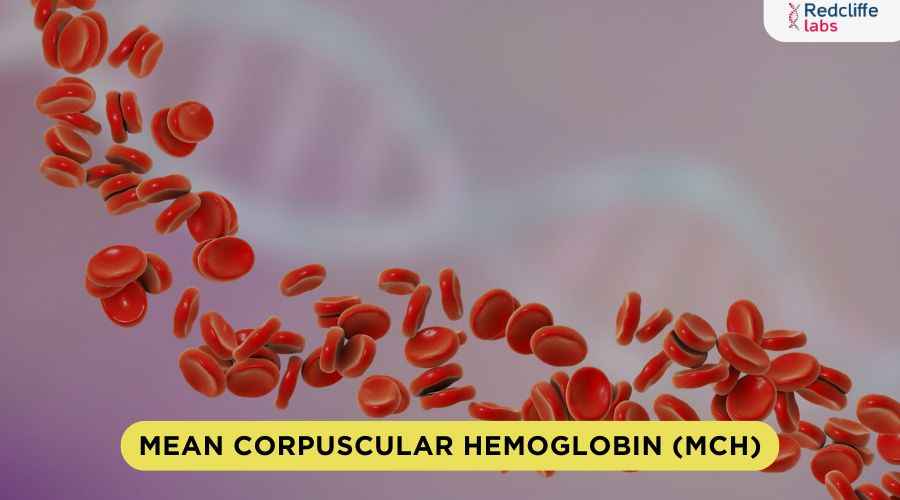MCH Test - Normal Range, Procedure, Preparation, & More

Medically Reviewed By
Dr Divya Rohra
Written By Sheena Mehta
on Dec 16, 2024
Last Edit Made By Sheena Mehta
on Jul 19, 2025

Mean Corpuscular Hemoglobin (MCH) is suggested to measure the average amount of hemoglobin per red blood cell. MCH is one value of the complete blood count (CBC) test, revealing if your body contains healthy red blood cells. In other words, doctors consider the details of CBC to calculate your MCH. Hemoglobin delivers oxygen anywhere in the body.
MCH, or mean corpuscular hemoglobin, is a protein that supports oxygen delivery throughout the body. It is a diagnostic blood test that measures the MCH levels in the blood and thus assesses your health.
Let’s discover the MCH test in detail.

What is MCH?
MCH, or mean corpuscular hemoglobin, is a protein that supports oxygen delivery throughout the body. Basically, it is a diagnostic blood test that measures the MCH levels in the blood and, thus, assesses your health.
You should distinguish MCH (Mean Corpuscular Hemoglobin) from MCHC (Mean Corpuscular Hemoglobin Concentration). Although both these tests are serological tests that are done to signify the health of hemoglobin in the blood. These are not the same. While the MCH is a measurement of hemoglobin in each red blood cell, MCHC refers to the average weight or average concentration of that hemoglobin in the RBCs.
As stated above, MCH is one part of the CBC; others include MCV, MCH, and Red Blood Cell Distribution Width (RDW).
Below is a table showing the difference between MCH, MCV, MCHC, and RDW.
| MCH | MCV | MCHC | RDW |
| MCH, or Mean Corpuscular Hemoglobin, measures the average hemoglobin amount per RBC. | Mean Corpuscular Volume (MCV) measures the average size of RBCs. | Unlike MCH and MCV, MCHC, or mean corpuscular hemoglobin concentration, measures the amount of hemoglobin concentration per red blood cell. | RDW, or Red Blood Cell Distribution Width, measures how the volume and size of your RBCs vary. |
What is the purpose of a Mean Corpuscular Hemoglobin (MCH)?
MCH calculates the average amount of hemoglobin contained in your red blood cells. Your doctor may suggest a mean corpuscular hemoglobin test to detect abnormally high or low levels of MCH. An MCH blood test makes it easy for a healthcare provider to know about nutrient deficiencies or chronic ailments in your body.
The main purpose of an MCH test is to diagnose anemia. Other reasons why the MCH test is done include:
- Your healthcare provider may suggest the MCH blood test to determine the average amount of hemoglobin in the blood.
- An MCH is not measured directly. It is measured by the CBC test.
- You may be suggested an MCH test if you suffer from macrocytic anemia. It is a blood disorder that reveals fewer healthy red blood cells in the body than normal. Symptoms can worsen with time, including:
- Fatigue
- Paleness of the skin
- Faster heartbeats
- Brittle nails
- Difficulty concentrating
- Confusion
- A need for an MCH test also arises if your doctor thinks that your body shows symptoms of high MCH levels in the blood, such as:
- Nausea
- Vomiting
- Diarrhea
- Irritability
- Loss of appetite
- Smoothness
- Sensations in the hands and feet
- Sensitive tongue
- Additionally, an MCH test is often a part of routine health checkups to evaluate anemia or a specific disorder.
Consult your doctor about specific signs and symptoms to help diagnose the problem. Then, develop a treatment strategy to avoid complications.
What does the MCH level determine?
A complete blood count (CBC) test helps determine the MCH. It measures the number, size, and content of red blood cells, white blood cells, platelets, and other types of blood cells.
Information to determine the MCH level:
- Collecting a blood sample: The trained specialist will draw a blood sample from your vein with the help of a needle.
- Preparing a blood sample: Your blood sample is centrifuged, segregating the RBC from the plasma.
- Measurement of hemoglobin: The expert uses a spectrophotometer to measure the hemoglobin amount.
- Red blood cell count: An automated cell counter reveals the number of red blood cells in the blood sample.
- MCH calculation: The MCH is calculated by dividing the total amount of hemoglobin by the number of red blood cells.
What is the procedure for an MCH test?
An MCH blood test is part of a complete blood count test, so a phlebotomist collects a small amount of blood from a vein in your arm using a needle. Then, he sends your blood sample to a laboratory to get tested. An MCH blood test report is prepared, dividing the hemoglobin amount by RBC count, resulting in an average hemoglobin amount per red blood cell.
How can you prepare for the MCH test?
Before the test, inform a doctor about all medications you are taking, such as those for high blood pressure, cholesterol, or other over-the-counter drugs. He recommends stopping taking them until the test is done, which helps improve the accuracy of your test results.
Discuss your doubts with your healthcare provider before the test to get the best medical advice. Consequently, he may also suggest you refrain from eating or drinking before the test, depending on your current health status. Get the most accurate test results.
Are there any side effects of the MCH test?
After you are done with giving blood for an MCH test, you may notice a small bruise on the punctured site. When the needle is inserted into a vein, your arm may be sore initially, but these symptoms usually go away in 2-3 days.
Although rare, you may experience excessive bleeding or infection at the puncture site. This usually happens due to multiple punctures to find a vein in your arm. Consult your doctor for immediate medical advice and get the best treatment possible.
What are normal MCH levels and MCH results?
The normal range for MCH levels may vary depending on the laboratory where the test was conducted. The measuring unit for MCH levels is picograms per cell, or pg/cell.
- In adults and children, normal MCH levels are 27 to 31 pg/cell.
- For newborns, normal MCH levels are 32 to 34 pg/cell.
Low MCH level
If your MCH blood test results show a low MCH level, an MCH value calculated below 27.5 pg.
Main Causes of Low MCH Levels:
Three main causes of low MCH levels are:
- Iron deficiency anemia: If your body lacks sufficient iron, it cannot produce hemoglobin. Iron deficiency anemia occurs due to blood loss primarily because of heavy menstrual bleeding, or excessive bleeding after surgery.
- Hemoglobinopathies: Some blood disorders, such as thalassemia and sickle cell anemia, are also responsible for low MCH levels. These are genetic disorders that cause hemoglobin to have an abnormal shape.
- Inflammation: Chronic, long-term diseases such as kidney disease, liver disease, and cancer can lead to inflammation, resulting in low MCH levels. While liver disease, such as liver cirrhosis, causes too much hemolysis as RBCs pass through the liver, thus destroying them faster than they are being formed, on the other hand, kidney disease will limit the production of a hormone called erythropoietin (EPO).

What are the symptoms of low MCH levels?
Common symptoms of low MCH levels include:
- Fatigue
- Pale skin
- Weakness
- Shortness of breath
- Abdominal swelling
- Dak-colored pee
- Feeling dizzy or lightheaded.
- Body pain
- Yellowish eyes and pain and swelling in hands and feet.
What are the natural ways to increase low MCH levels?
Low MCH levels mainly occur due to iron deficiency anemia. However, you can treat this condition following the same:
- Eat iron-rich foods such as spinach, beef, liver, fortified breakfast cereals, legumes, lentils, and strawberries. Vitamin C and fiber-rich foods should also be added to increase MCH levels in the body.
- Address vitamin deficiencies: To correct MCH levels, it is essential to address vitamin deficiencies in the body, such as vitamin B6, B9 (folic acid), or B12.
- Iron supplements: Your healthcare provider may suggest iron supplements to treat low MCH in the body.
- Blood transfusions: If your test reports show that the low MCH level is due to thalassemia, he may suggest blood transfusions to manage the condition.
- Nevertheless, if you have an autoimmune disorder, your doctor may suggest steroids or immunosuppressants to treat the problem.
High MCH level
A high MCH level indicates a condition called macrocytic anemia. This means the body produces abnormally large red blood cells containing too much hemoglobin.
Main Causes Of High MCH Levels:
- Vitamin D deficiency or folate deficiency: A high MCH level occurs when the body lacks RBCs, folate, and B12 or due to a pre-existing condition that prevents the full absorption of these nutrients.
- Alcohol misuse: High MCH blood scores may also be the result of long-term alcohol use. Too much alcohol consumption can interfere with vitamin B12 absorption.
- A problematic thyroid gland can also be responsible for elevated MCH levels in the body.
- Additionally, medications for ongoing treatments such as chemotherapy, hydroxyurea spherocytosis, antibiotics, and antivirals can cause an increase in MCH levels.
Any abnormality in your MCH level needs to be addressed. Hence, if your MCH levels are abnormal, you should meet with your healthcare provider. He may suggest additional testing, especially if the results indicate a separate condition.
What are the symptoms of high MCH levels?
The symptoms of high MCH levels are defined as hyperchromia, depending on how severe your problem is.
Common symptoms of high MCH levels are:
- Too much drinking
- Nausea or vomiting
- Brittle nails
- Some blood cancers
- Lack of vitamin B12 or folate
- Hypothyroidism
- Irritability
- Depression
- Difficulty breathing
- Medications
How can you treat high MCH levels?
Here are a few useful tips to treat high MCH levels:
- Vitamin Deficiencies: Take vitamin B6 or B12 adequately to control high MCH levels.
- Liver Disease: Ensure liver disease is treated to help manage high MCH levels.
- Hypothyroidism: A condition causing the thyroid gland to function abnormally can cause elevated MCH levels. Hence, it needs to be treated.
- Reduce alcoholism: Too much alcohol consumption is not good for elevated MCH levels. Hence, you need to reduce alcohol consumption to correct high MCH levels.
Conclusion
If you are anxious about your MCH levels, consult your doctor immediately. He will examine you carefully and ask questions based on the information you provided. He may suggest a blood test to determine whether your MCH levels are normal, high, or low. Any abnormality in your MCH levels may be due to blood disorders or other underlying conditions that need monitoring and treatment.
Why Healthy India ki Trusted Lab—--Redcliffe Labs?
Healthy India ki Trusted Labs—Redcliffe Labs is the fastest-growing omnichannel in India, providing world-class diagnostic services in over 220 cities. It is among the country's most trusted labs, offering a full-body checkup at home, blood tests online with free home sample collection, and other pathology services. Further, it lets you discover the most affordable health tests and packages at pocket-friendly prices for proactive well-being.
If your healthcare provider suggests an MCH blood test, you can book it online at home from Redcliffe Labs. Get the most accurate report within a given deadline.
Step-by-step information on booking a blood test online for MCH levels from Redcliffe Labs:
- Visit the official Redcliffe Labs website: https://redcliffelabs.com/.
- Search for the specific test you need.
- Add the test to the cart.
- Complete the payment process online.
- You will receive confirmation through SMS and WhatsApp.
Frequently Asked Questions: FAQs
1. What are the ranges for MCH levels?
As part of a CBC, low MCH levels are under 27 pg per red blood cell, normal ranges between 27 and 31 pg per red blood cell, and high MCH ranges over 31 pg per red blood cell.
2. What are the main causes of low MCH levels?
A low MCH level typically means the calculated MCH value is below 27 pg per red blood cell. The main causes of low MCH levels are iron deficiency anemia, thalassemia, and autoimmune diseases.
3. What are the main causes of high MCH levels?
A high MCH level typically means the calculated MCH value is over 31 pg per red blood cell. The main causes of high MCH levels are alcoholism, hypothyroidism, medications, and liver & lung disease.
4. Do you need to worry about low or high MCH levels?
Yes. Low or high MCH levels can increase your anxiety or stress. These conditions need to be managed. Some lifestyle changes, such as taking adequate vitamins, medications, and even injections, can help.
5. What are Mean Corpuscular Hemoglobin (MCH) levels?
Mean corpuscular hemoglobin levels, or MCH levels, indicate the average amount of a protein called hemoglobin per red blood cell.
6. What does within the MCH reference range mean?
Within the MCH reference range, it indicates normochromic anemia, which occurs due to sudden blood loss, kidney failure, or chronic disease.
7. What does a higher-than-normal MCH reference range mean?
A higher-than-normal MCH reference range means you have hyperchromic anemia. This type of anemia occurs due to low folate, vitamin B12, or chemotherapy.
8. What does a lower-than-normal MCH reference range mean?
A lower-than-normal MCH reference range means you have hypochromic anemia. This type of anemia occurs due to iron deficiency or thalassemia.



